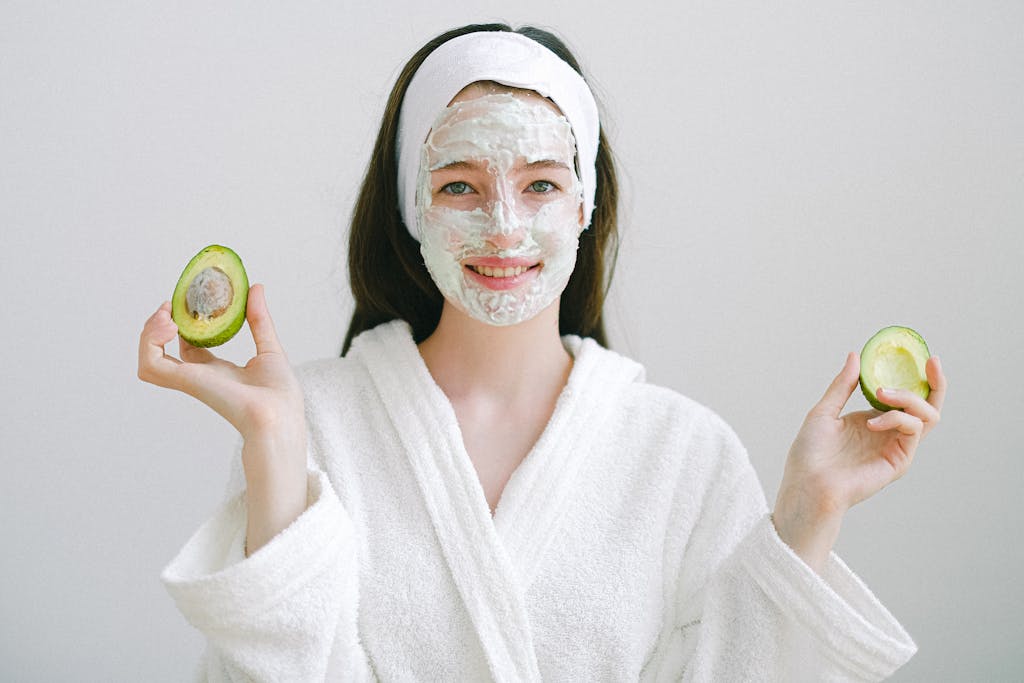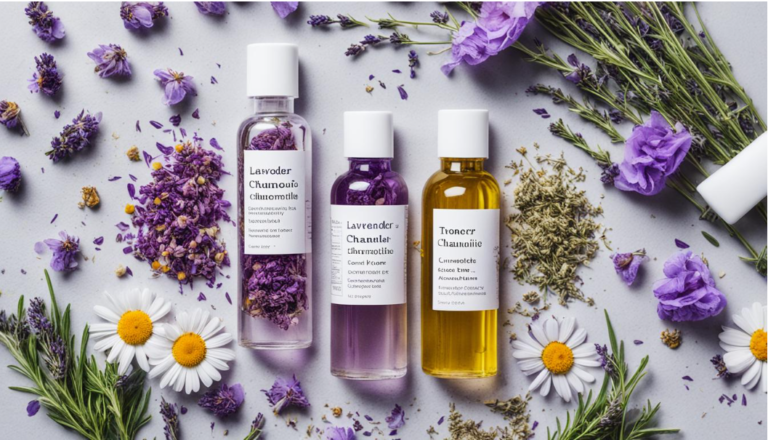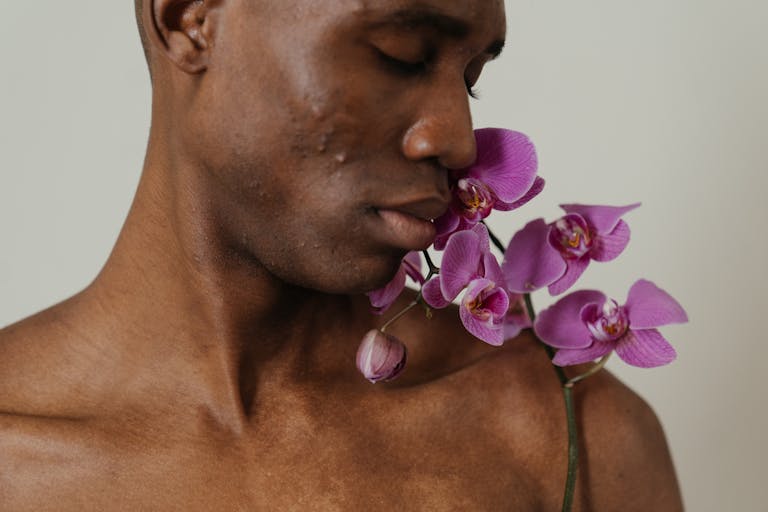Homemade Beauty: 6 Top DIY Natural Skincare Recipes
Did you know that the average person applies more than 120 chemicals to their skin every day? From skincare products to makeup, we unknowingly expose ourselves to a multitude of potentially harmful substances. But what if we told you that there’s a safer, more natural way to achieve a healthy complexion?
Welcome to the world of homemade beauty and DIY natural skincare recipes. In this article, we will guide you through a collection of at-home solutions that harness the power of natural ingredients to nourish and rejuvenate your skin. Get ready to embrace the DIY spirit and unlock the secrets to healthy, radiant skin.
Key Takeaways:
- By making your own skincare products, you can control the ingredients and avoid potentially harmful chemicals.
- Natural ingredients have healing properties that can nourish and rejuvenate your skin.
- DIY skincare recipes are affordable, effective, and customizable to your specific skin needs.
- Creating your own organic skincare treatments allows you to tailor the products to your preferences and skin concerns.
- Embracing the DIY spirit can lead to healthier skin and a sense of empowerment in your skincare routine.
Introduction to Homemade Beauty and DIY Natural Skincare Recipes
Welcome to the wonderful world of homemade beauty and natural skincare! In this section, we will explore the benefits of creating your own skincare products and using natural ingredients to enhance your beauty routine. By harnessing the power of DIY natural skincare recipes, you can achieve healthier, glowing skin while also having full control over the ingredients you put on your skin.
When it comes to skincare, there is an abundance of products available in the market, each claiming to deliver miraculous results. However, many of these products are filled with chemicals and synthetic ingredients that may do more harm than good. By choosing homemade beauty solutions, you can eliminate the harmful chemicals and enjoy the natural goodness of plant-based ingredients.
Try the DIY Skincare Recipe Generator https://websim.ai/c/MKxNrExSKoE6bgH7y
One of the greatest advantages of DIY skincare is that it allows you to customize your products to suit your unique skin needs. Whether you have sensitive skin, acne-prone skin, or dry skin, you can tailor your homemade skincare recipes to address your specific concerns. This personalized approach ensures that you are using products that work in harmony with your skin, promoting a healthy and balanced complexion.
Moreover, creating your own skincare products can be a fun and rewarding experience. It allows you to tap into your creativity and experiment with different ingredients and formulations. You can also customize the scents and textures of your products to make your skincare routine a truly enjoyable and sensorial experience.
Whether you are a skincare enthusiast looking to switch to natural alternatives or someone who enjoys getting crafty in the kitchen, the world of homemade beauty offers endless possibilities. So let’s dive in and discover the wonders of DIY natural skincare!
The Benefits of Using Natural Ingredients for Skincare
In today’s world, where chemical-laden products dominate the skincare industry, it’s essential to consider the benefits of natural ingredients for our skin. Natural ingredients not only provide effective skincare solutions but also offer long-term wellness benefits. Let’s explore the healing properties of herbs and oils, as well as why chemical-free skincare is crucial for our overall health.
Understanding the Healing Properties of Herbs and Oils
Nature has gifted us with a wide array of herbs and oils that possess incredible healing properties for our skin. These natural ingredients are rich in vitamins, antioxidants, and minerals, which nourish, replenish, and rejuvenate the skin. Herbs like lavender, chamomile, and rosemary soothe inflammation, heal blemishes, and promote a healthy complexion. Oils such as argan, jojoba, and rosehip deliver essential nutrients, lock in moisture, and restore the skin’s natural barrier, resulting in a radiant and youthful appearance.
To fully benefit from these healing properties, it’s crucial to choose skincare products that harness the power of natural ingredients. By incorporating natural herbs and oils into your skincare routine, you can experience the transformative effects of these botanical wonders firsthand.
Why Chemical-free Skincare is Essential for Long-term Wellness
Chemicals commonly found in commercial skincare products can have detrimental effects on our skin and overall well-being. Ingredients like parabens, sulfates, and synthetic fragrances may cause allergic reactions, disrupt hormonal balance, and contribute to skin conditions like eczema and acne. Moreover, these harsh chemicals can accumulate in our bodies and have long-term health implications.
Choosing chemical-free skincare products is crucial for long-term wellness. Natural ingredients provide a safer and healthier alternative to synthetic chemicals, as they are gentle yet effective in addressing various skincare concerns. By opting for natural skincare, we prioritize not only the health of our skin but also our overall well-being.
Simple and Effective DIY Skin Treatments You Can Make at Home
Transform your skincare routine with these simple and effective DIY skin treatments that can be easily made at home. Say goodbye to expensive commercial products and hello to natural, homemade remedies that address common skincare concerns while nourishing and hydrating your skin. From face masks to toners, these affordable and effective solutions will give you a healthy and radiant complexion.
Take a look at some of our favorite DIY skin treatments:
“Beauty is power, and skincare is its key.”
– Brooke Shields
- Hydrating Honey and Avocado Face Mask: Combine mashed avocado, a spoonful of honey, and a squeeze of lemon juice. Apply to your face and leave it on for 15 minutes before rinsing off. This mask deeply moisturizes and nourishes the skin.
- Refreshing Cucumber Toner: Blend peeled and chopped cucumber with witch hazel and a few drops of rose water. Strain the mixture and transfer it to a spray bottle. Use it as a toner after cleansing to hydrate and soothe your skin.
- Gentle Oatmeal and Yogurt Scrub: Mix ground oats with plain yogurt to create a gentle exfoliating scrub. Massage it onto your skin in circular motions and rinse off for a smooth and glowing complexion.
- Brightening Turmeric Face Mask: Combine turmeric powder, Greek yogurt, and a teaspoon of honey. Apply the mixture to your face and leave it on for 10-15 minutes. This mask helps to reduce inflammation and brighten the skin.
These DIY skin treatments are just the tip of the iceberg when it comes to homemade skincare remedies. Get creative in your kitchen and experiment with different natural ingredients to find the perfect solutions for your unique skin needs. With these simple skincare solutions, you can achieve a healthy and radiant complexion without breaking the bank.
DIY Natural Skincare Recipes

In this section, we will share a variety of easy homemade skincare recipes that you can make yourself using natural ingredients. These DIY recipes will help you achieve a healthy and glowing complexion without the use of harsh chemicals or expensive products. From moisturizers to serums and scrubs, there’s something for everyone in these natural skincare recipes.
So, let’s dive in and discover the power of DIY natural skincare!
“The best skincare is the one that’s made by you.”
Moisturizer Recipe
Give your skin the hydration it deserves with this simple and effective DIY moisturizer recipe:
- Ingredients:
- 1 tablespoon shea butter
- 1 tablespoon coconut oil
- 1 teaspoon jojoba oil
- Instructions:
- In a small bowl, melt the shea butter and coconut oil together.
- Add the jojoba oil and mix well.
- Allow the mixture to cool and solidify.
- Apply a small amount to your face and neck, massaging gently.
Serum Recipe
Elevate your skincare routine with this nourishing DIY serum:
- Ingredients:
- 1 tablespoon rosehip oil
- 5 drops vitamin E oil
- 3 drops lavender essential oil
- Instructions:
- In a small dropper bottle, combine the rosehip oil, vitamin E oil, and lavender essential oil.
- Shake well to mix the ingredients thoroughly.
- After cleansing and toning your skin, apply a few drops of the serum and gently massage it into your face and neck.
Exfoliating Scrub Recipe
Revitalize your skin with this easy-to-make exfoliating scrub:
- Ingredients:
- 2 tablespoons ground coffee
- 1 tablespoon coconut oil
- 1 tablespoon brown sugar
- Instructions:
- In a bowl, combine the ground coffee, coconut oil, and brown sugar.
- Massage the scrub onto damp skin in gentle circular motions.
- Rinse off with warm water and pat dry.
These DIY natural skincare recipes are just the tip of the iceberg. Get creative and experiment with different natural skincare ingredients to find the perfect recipes for your skin. By making your own skincare products, you’ll not only save money but also have greater control over what goes onto your skin.
Remember, beautiful and healthy skin starts with easy homemade skincare recipes!
Nourishing DIY Face Masks and Scrubs for Radiant Skin
Creating your own DIY face masks and scrubs is a wonderful way to nourish and rejuvenate your skin, leaving it with a natural, radiant glow. By using organic ingredients, you can ensure that you are treating your skin with utmost care, avoiding harsh chemicals and synthetic additives.
Organic Ingredients for Gentle Exfoliation
When it comes to exfoliation, organic ingredients can provide effective yet gentle alternatives to commercial products. Natural exfoliants like sugar, oatmeal, and coffee grounds can remove dead skin cells, unclog pores, and reveal a smoother complexion. These ingredients are not only eco-friendly but also affordable, making them perfect for DIY skincare.
Hydrating Masks for Different Skin Types
Hydrating masks are a great way to replenish moisture and nourish the skin. Different skin types have different needs, so it’s important to choose ingredients that cater to your specific skin type.
For dry skin, try a hydrating mask with ingredients like avocado, honey, and yogurt. These ingredients are rich in antioxidants and nutrients that can deeply moisturize and soothe dry, flaky skin.
If you have oily or acne-prone skin, opt for masks that contain ingredients like clay, tea tree oil, and aloe vera. These can help regulate oil production, minimize pores, and reduce inflammation.
Sensitive skin can benefit from masks with gentle ingredients such as cucumber, chamomile, and oatmeal. These ingredients have calming properties that can soothe and nourish sensitive skin without causing irritation.
Regardless of your skin type, it’s always a good idea to patch test any new ingredient or product before applying it to your entire face. This will help you determine if your skin has any adverse reactions.
DIY Face Masks and Scrubs Recipes
To get you started, here are a few simple DIY face masks and scrubs recipes using organic ingredients:
Refreshing Strawberry Scrub
- 1 cup of fresh strawberries
- 2 tablespoons of honey
- ½ cup of sugar
Soothing Green Tea Mask
- 1 green tea bag
- 1 tablespoon of plain yogurt
- 1 teaspoon of honey
Moisturizing Banana Mask
- ½ ripe banana
- 1 tablespoon of honey
- 1 tablespoon of coconut oil
| Recipe | Ingredients |
|---|---|
| Refreshing Strawberry Scrub | 1 cup of fresh strawberries, 2 tablespoons of honey, ½ cup of sugar |
| Soothing Green Tea Mask | 1 green tea bag, 1 tablespoon of plain yogurt, 1 teaspoon of honey |
| Moisturizing Banana Mask | ½ ripe banana, 1 tablespoon of honey, 1 tablespoon of coconut oil |
How to Create Your Own Organic Skincare Treatments
In this section, we will guide you on how to create your own organic skincare treatments. By using natural ingredients and following simple steps, you can formulate homemade organic skincare remedies tailored to your specific needs. Let’s dive in!

When it comes to creating organic skincare treatments, the key is to use high-quality, organic ingredients. These ingredients are free from harmful chemicals and pesticides, ensuring that your skincare products are gentle and beneficial for your skin.
Here are some tips to help you get started:
- Research and Sourcing: Start by researching different natural skincare ingredients and their benefits. Look for reputable suppliers that offer organic and ethically sourced ingredients.
- Choosing the Right Recipes: Select DIY skincare recipes that align with your skin type and concerns. Whether you’re looking to hydrate dry skin or address acne, there’s a homemade remedy for you.
- Gathering the Ingredients: Once you’ve chosen your recipes, gather all the necessary organic ingredients. Make a list and ensure that you have everything you need before you begin.
- Following the Instructions: Carefully follow the step-by-step instructions provided in the recipe. Pay attention to measurements, temperatures, and any special techniques required.
- Storage and Shelf Life: Ensure that you store your homemade skincare products correctly to maintain their freshness and efficacy. Some products may require refrigeration, while others can be stored in a cool, dark place.
By creating your own organic skincare treatments, you have control over the ingredients and can customize them to suit your skin’s unique needs. It’s a wonderful way to indulge in self-care while ensuring that you’re using natural, nourishing products on your skin.
Now that you know how to create your own organic skincare treatments, it’s time to get creative and start your journey to healthier, more radiant skin. Take advantage of the wealth of natural skincare knowledge available and enjoy the benefits of homemade beauty!
Holistic Skincare Remedies for Common Skin Problems
In our quest for healthy and radiant skin, it’s important to take a holistic approach that addresses the root causes of common skin problems. In this section, we will explore natural remedies and skincare solutions that can help combat issues such as acne, dryness, and dullness. By incorporating these holistic skincare remedies into your routine, you can achieve lasting improvements and maintain a vibrant complexion.
One effective holistic remedy for acne is tea tree oil. Known for its antimicrobial properties, tea tree oil can help reduce inflammation and fight acne-causing bacteria. Simply dilute a few drops of tea tree oil with a carrier oil, and apply it to the affected areas. This natural remedy can help clear breakouts and promote a clearer complexion.
To combat dryness, consider incorporating nourishing ingredients such as aloe vera and honey into your skincare routine. Aloe vera is known for its hydrating and soothing properties, while honey acts as a natural humectant, attracting and retaining moisture in the skin. You can create a hydrating mask by combining equal parts aloe vera gel and raw honey, applying it to your face, and leaving it on for 15-20 minutes before rinsing off.
Dull and lackluster skin can benefit from gentle exfoliation and brightening ingredients. One natural remedy is to create a DIY face scrub using ingredients like ground coffee or brown sugar mixed with coconut oil. This scrub helps slough away dead skin cells, revealing a brighter complexion underneath. Additionally, incorporating citrus fruits such as lemon or orange into your skincare routine can help promote radiance and even out skin tone.
Aside from skincare remedies, lifestyle changes can also contribute to holistic skincare. Ensuring you have a balanced diet rich in antioxidants and essential nutrients can support skin health from the inside out. Drinking plenty of water and getting enough sleep are also crucial for maintaining a healthy complexion.
Incorporating these holistic skincare remedies, natural ingredients, and lifestyle changes into your daily routine can help address common skin problems and promote overall skin health. By taking a holistic approach, you can achieve lasting results and embrace a skincare regimen that nurtures your skin’s natural beauty.

Personalize Your Skincare: Adapting Recipes to Your Skin’s Needs
In order to achieve the best results with your DIY skincare routine, it’s important to personalize the recipes to suit your skin’s unique needs. By adapting the recipes, you can address specific concerns and create a skincare routine that caters to your individual requirements.
Tailoring DIY Recipes for Sensitive Skin
If you have sensitive skin, it’s essential to choose ingredients that are gentle and soothing. When adapting DIY skincare recipes for sensitive skin, consider the following:
- Opt for natural and fragrance-free ingredients to minimize the risk of irritation.
- Avoid harsh exfoliants and abrasive materials that can cause redness and sensitivity.
- Test new recipes on a small patch of skin before applying them to your entire face to check for any adverse reactions.
- Consult with a dermatologist if you have any concerns or allergies.
By making these adjustments, you can create skincare products that are safe and effective for your sensitive skin.
Adding Essential Oils for Aromatherapy Benefits
Incorporating essential oils into your DIY skincare recipes not only offers aromatic benefits but can also provide additional therapeutic properties for your skincare routine. Here are some popular essential oils and their potential aromatherapy benefits:
Lavender: Calming and soothing, lavender essential oil can help reduce stress and promote relaxation.
Tea Tree: Known for its antibacterial properties, tea tree essential oil can assist in clearing acne and blemishes.
Frankincense: With its rejuvenating properties, frankincense essential oil can help improve the appearance of fine lines and wrinkles.
When adding essential oils to your DIY skincare recipes, be mindful of their potency. Always dilute essential oils with a carrier oil and follow recommended usage guidelines.
Personalizing your skincare recipes by adapting them for sensitive skin and incorporating essential oils can enhance the effectiveness and enjoyment of your DIY skincare routine. Experiment with different ingredients and formulations to find the perfect combination for your skin’s unique needs.

Conclusion
In conclusion, embracing the DIY spirit is key to achieving healthier skin through homemade beauty. By creating your own natural skincare products, you have the power to nourish and transform your complexion. The benefits of homemade beauty are numerous, ranging from using safe and natural ingredients to personalizing your skincare routine.
We encourage you to try out the DIY natural skincare recipes provided in this article. Experiment with different ingredients and techniques to find the perfect solutions for your skin. As you embark on this journey, remember to listen to your skin’s needs and make adjustments accordingly.
Furthermore, we invite you to share your success stories with us and the community. Whether it’s a glowing complexion, reduced acne, or improved hydration, your experiences can inspire others to embark on their own homemade beauty journey. Together, we can create a community of skincare enthusiasts who embrace the power of natural ingredients and DIY solutions.
Share your story with us! Comment below with your DIY successes and become a part of the movement towards a greener, cleaner beauty world.
FAQ
What are the benefits of creating your own skincare products?
Creating your own skincare products allows you to have full control over the ingredients used. You can customize the products to suit your specific needs and avoid harsh chemicals and additives commonly found in commercial skincare products.
Why is using natural ingredients in skincare important?
Natural ingredients are packed with vitamins, minerals, and antioxidants that nourish and rejuvenate the skin. They are less likely to cause irritation or allergic reactions compared to synthetic ingredients found in commercial products.
Are there any risks associated with commercial skincare products?
Yes, commercial skincare products often contain chemicals and preservatives that can be harmful to the skin and overall health. Prolonged use of these products may lead to skin sensitivities, allergies, and other adverse reactions.
What are some simple and effective DIY skin treatments that can be made at home?
Some simple DIY skin treatments include homemade face masks, toners, and serums. These treatments can address common skincare concerns like acne, dryness, and dullness, and provide nourishment and hydration to the skin.
Can you provide some DIY natural skincare recipes?
Absolutely! Here are a few DIY natural skincare recipes:
– Moisturizer: Mix equal parts shea butter and coconut oil, and add a few drops of your favorite essential oil for fragrance.
– Face scrub: Combine 1 tablespoon of honey, 1 tablespoon of brown sugar, and 1 teaspoon of olive oil. Gently massage onto damp skin and rinse.
– Face mask: Mix 2 tablespoons of plain yogurt, 1 tablespoon of honey, and 1 tablespoon of turmeric powder. Apply to the face, leave on for 15 minutes, and rinse off.
How can organic ingredients be beneficial for gentle exfoliation?
Organic ingredients like oatmeal, sugar, and coffee grounds can be used as gentle exfoliants. They remove dead skin cells, unclog pores, and reveal smoother, brighter skin without causing irritation or damage.
What are some hydrating mask recipes for different skin types?
For dry skin, mix 1 ripe avocado, 1 tablespoon of honey, and 1 tablespoon of olive oil. For oily skin, mix 1 tablespoon of bentonite clay, 1 tablespoon of aloe vera gel, and a few drops of tea tree oil. For combination skin, mix 1 tablespoon of yogurt, 1 tablespoon of honey, and 1 tablespoon of mashed cucumber.
How can I create my own organic skincare treatments?
To create your own organic skincare treatments, start by sourcing high-quality organic ingredients like oils, butters, herbs, and essential oils. Follow recipes or experiment with different combinations to create products that suit your specific skincare needs.
What are some holistic skincare remedies for common skin problems?
Some holistic skincare remedies include drinking plenty of water, eating a balanced diet rich in fruits and vegetables, getting regular exercise, managing stress levels, and using natural ingredients like aloe vera, tea tree oil, and chamomile for specific skin concerns.
How can I adapt DIY skincare recipes for sensitive skin?
For sensitive skin, it’s important to patch-test any new ingredients before applying them to your entire face. Use gentle ingredients like oatmeal, chamomile, and coconut oil. Start with small amounts and gradually increase if your skin tolerates it well.
Can essential oils be added to skincare recipes for aromatherapy benefits?
Yes, essential oils can be added to skincare recipes for aromatherapy benefits. However, it’s crucial to dilute them properly in carrier oils to avoid skin irritation. Consult a reliable source or an aromatherapist for proper usage guidelines.






